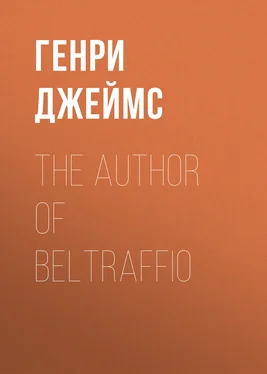Генри Джеймс - The Author of Beltraffio
Здесь есть возможность читать онлайн «Генри Джеймс - The Author of Beltraffio» — ознакомительный отрывок электронной книги совершенно бесплатно, а после прочтения отрывка купить полную версию. В некоторых случаях можно слушать аудио, скачать через торрент в формате fb2 и присутствует краткое содержание. Жанр: foreign_prose, foreign_antique, на английском языке. Описание произведения, (предисловие) а так же отзывы посетителей доступны на портале библиотеки ЛибКат.
- Название:The Author of Beltraffio
- Автор:
- Жанр:
- Год:неизвестен
- ISBN:нет данных
- Рейтинг книги:3 / 5. Голосов: 1
-
Избранное:Добавить в избранное
- Отзывы:
-
Ваша оценка:
- 60
- 1
- 2
- 3
- 4
- 5
The Author of Beltraffio: краткое содержание, описание и аннотация
Предлагаем к чтению аннотацию, описание, краткое содержание или предисловие (зависит от того, что написал сам автор книги «The Author of Beltraffio»). Если вы не нашли необходимую информацию о книге — напишите в комментариях, мы постараемся отыскать её.
The Author of Beltraffio — читать онлайн ознакомительный отрывок
Ниже представлен текст книги, разбитый по страницам. Система сохранения места последней прочитанной страницы, позволяет с удобством читать онлайн бесплатно книгу «The Author of Beltraffio», без необходимости каждый раз заново искать на чём Вы остановились. Поставьте закладку, и сможете в любой момент перейти на страницу, на которой закончили чтение.
Интервал:
Закладка:
There was genius in his house too I thought when we got there; there was imagination in the carpets and curtains, in the pictures and books, in the garden behind it, where certain old brown walls were muffled in creepers that appeared to me to have been copied from a masterpiece of one of the pre-Raphaelites. That was the way many things struck me at that time, in England—as reproductions of something that existed primarily in art or literature. It was not the picture, the poem, the fictive page, that seemed to me a copy; these things were the originals, and the life of happy and distinguished people was fashioned in their image. Mark Ambient called his house a cottage, and I saw afterwards he was right for if it hadn’t been a cottage it must have been a villa, and a villa, in England at least, was not a place in which one could fancy him at home. But it was, to my vision, a cottage glorified and translated; it was a palace of art, on a slightly reduced scale—and might besides have been the dearest haunt of the old English genius loci . It nestled under a cluster of magnificent beeches, it had little creaking lattices that opened out of, or into, pendent mats of ivy, and gables, and old red tiles, as well as a general aspect of being painted in water-colours and inhabited by people whose lives would go on in chapters and volumes. The lawn seemed to me of extraordinary extent, the garden-walls of incalculable height, the whole air of the place delightfully still, private, proper to itself. “My wife must be somewhere about,” Mark Ambient said as we went in. “We shall find her perhaps—we’ve about an hour before dinner. She may be in the garden. I’ll show you my little place.”
We passed through the house and into the grounds, as I should have called them, which extended into the rear. They covered scarce three or four acres, but, like the house, were very old and crooked and full of traces of long habitation, with inequalities of level and little flights of steps—mossy and cracked were these—which connected the different parts with each other. The limits of the place, cleverly dissimulated, were muffled in the great verdurous screens. They formed, as I remember, a thick loose curtain at the further end, in one of the folds of which, as it were, we presently made out from afar a little group. “Ah there she is!” said Mark Ambient; “and she has got the boy.” He noted that last fact in a slightly different tone from any in which he yet had spoken. I wasn’t fully aware of this at the time, but it lingered in my ear and I afterwards understood it.
“Is it your son?” I inquired, feeling the question not to be brilliant.
“Yes, my only child. He’s always in his mother’s pocket. She coddles him too much.” It came back to me afterwards too—the sound of these critical words. They weren’t petulant; they expressed rather a sudden coldness, a mechanical submission. We went a few steps further, and then he stopped short and called the boy, beckoning to him repeatedly.
“Dolcino, come and see your daddy!” There was something in the way he stood still and waited that made me think he did it for a purpose. Mrs. Ambient had her arm round the child’s waist, and he was leaning against her knee; but though he moved at his father’s call she gave no sign of releasing him. A lady, apparently a neighbour, was seated near her, and before them was a garden-table on which a tea-service had been placed.
Mark Ambient called again, and Dolcino struggled in the maternal embrace; but, too tightly held, he after two or three fruitless efforts jerked about and buried his head deep in his mother’s lap. There was a certain awkwardness in the scene; I thought it odd Mrs. Ambient should pay so little attention to her husband. But I wouldn’t for the world have betrayed my thought, and, to conceal it, I began loudly to rejoice in the prospect of our having tea in the garden. “Ah she won’t let him come!” said my host with a sigh; and we went our way till we reached the two ladies. He mentioned my name to his wife, and I noticed that he addressed her as “My dear,” very genially, without a trace of resentment at her detention of the child. The quickness of the transition made me vaguely ask myself if he were perchance henpecked—a shocking surmise which I instantly dismissed. Mrs. Ambient was quite such a wife as I should have expected him to have; slim and fair, with a long neck and pretty eyes and an air of good breeding. She shone with a certain coldness and practised in intercourse a certain bland detachment, but she was clothed in gentleness as in one of those vaporous redundant scarves that muffle the heroines of Gainsborough and Romney. She had also a vague air of race, justified by my afterwards learning that she was “connected with the aristocracy.” I have seen poets married to women of whom it was difficult to conceive that they should gratify the poetic fancy—women with dull faces and glutinous minds, who were none the less, however, excellent wives. But there was no obvious disparity in Mark Ambient’s union. My hostess—so far as she could be called so—delicate and quiet, in a white dress, with her beautiful child at her side, was worthy of the author of a work so distinguished as “Beltraffio.” Round her neck she wore a black velvet ribbon, of which the long ends, tied behind, hung down her back, and to which, in front, was attached a miniature portrait of her little boy. Her smooth shining hair was confined in a net. She gave me an adequate greeting, and Dolcino—I thought this small name of endearment delightful—took advantage of her getting up to slip away from her and go to his father, who seized him in silence and held him high for a long moment, kissing him several times.
I had lost no time in observing that the child, not more than seven years old, was extraordinarily beautiful. He had the face of an angel—the eyes, the hair, the smile of innocence, the more than mortal bloom. There was something that deeply touched, that almost alarmed, in his beauty, composed, one would have said, of elements too fine and pure for the breath of this world. When I spoke to him and he came and held out his hand and smiled at me I felt a sudden strange pity for him—quite as if he had been an orphan or a changeling or stamped with some social stigma. It was impossible to be in fact more exempt from these misfortunes, and yet, as one kissed him, it was hard to keep from murmuring all tenderly “Poor little devil!” though why one should have applied this epithet to a living cherub is more than I can say. Afterwards indeed I knew a trifle better; I grasped the truth of his being too fair to live, wondering at the same time that his parents shouldn’t have guessed it and have been in proportionate grief and despair. For myself I had no doubt of his evanescence, having already more than once caught in the fact the particular infant charm that’s as good as a death-warrant.
The lady who had been sitting with Mrs. Ambient was a jolly ruddy personage in velveteen and limp feathers, whom I guessed to be the vicar’s wife—our hostess didn’t introduce me—and who immediately began to talk to Ambient about chrysanthemums. This was a safe subject, and yet there was a certain surprise for me in seeing the author of “Beltraffio” even in such superficial communion with the Church of England. His writings implied so much detachment from that institution, expressed a view of life so profane, as it were, so independent and so little likely in general to be thought edifying, that I should have expected to find him an object of horror to vicars and their ladies—of horror repaid on his own part by any amount of effortless derision. This proved how little I knew as yet of the English people and their extraordinary talent for keeping up their forms, as well as of some of the mysteries of Mark Ambient’s hearth and home. I found afterwards that he had, in his study, between nervous laughs and free cigar-puffs, some wonderful comparisons for his clerical neighbours; but meanwhile the chrysanthemums were a source of harmony, he and the vicaress were equally attached to them, and I was surprised at the knowledge they exhibited of this interesting plant. The lady’s visit, however, had presumably been long, and she presently rose for departure and kissed Mrs. Ambient. Mark started to walk with her to the gate of the grounds, holding Dolcino by the hand.
Читать дальшеИнтервал:
Закладка:
Похожие книги на «The Author of Beltraffio»
Представляем Вашему вниманию похожие книги на «The Author of Beltraffio» списком для выбора. Мы отобрали схожую по названию и смыслу литературу в надежде предоставить читателям больше вариантов отыскать новые, интересные, ещё непрочитанные произведения.
Обсуждение, отзывы о книге «The Author of Beltraffio» и просто собственные мнения читателей. Оставьте ваши комментарии, напишите, что Вы думаете о произведении, его смысле или главных героях. Укажите что конкретно понравилось, а что нет, и почему Вы так считаете.












